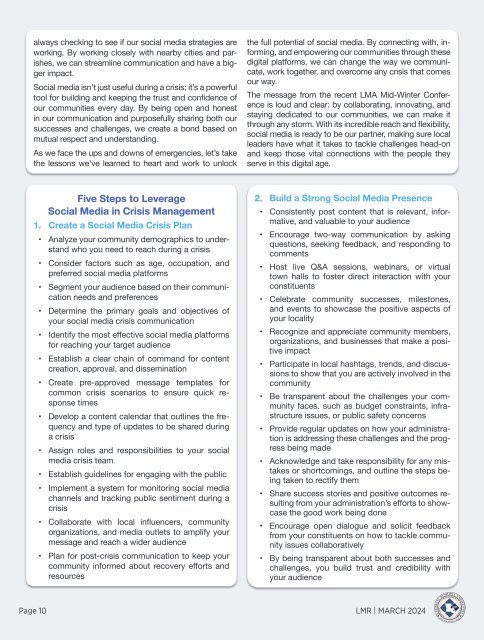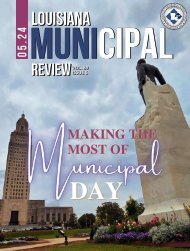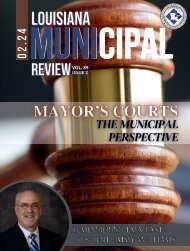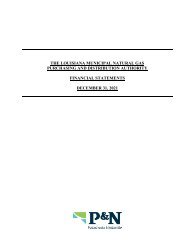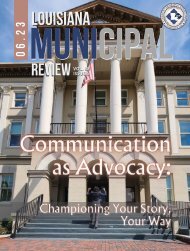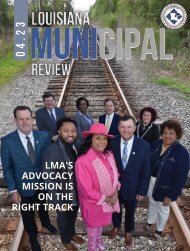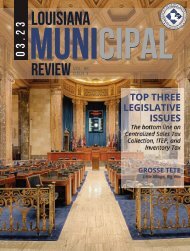MARCH 2024
You also want an ePaper? Increase the reach of your titles
YUMPU automatically turns print PDFs into web optimized ePapers that Google loves.
always checking to see if our social media strategies are<br />
working. By working closely with nearby cities and parishes,<br />
we can streamline communication and have a bigger<br />
impact.<br />
Social media isn’t just useful during a crisis; it’s a powerful<br />
tool for building and keeping the trust and confidence of<br />
our communities every day. By being open and honest<br />
in our communication and purposefully sharing both our<br />
successes and challenges, we create a bond based on<br />
mutual respect and understanding.<br />
As we face the ups and downs of emergencies, let’s take<br />
the lessons we’ve learned to heart and work to unlock<br />
the full potential of social media. By connecting with, informing,<br />
and empowering our communities through these<br />
digital platforms, we can change the way we communicate,<br />
work together, and overcome any crisis that comes<br />
our way.<br />
The message from the recent LMA Mid-Winter Conference<br />
is loud and clear: by collaborating, innovating, and<br />
staying dedicated to our communities, we can make it<br />
through any storm. With its incredible reach and flexibility,<br />
social media is ready to be our partner, making sure local<br />
leaders have what it takes to tackle challenges head-on<br />
and keep those vital connections with the people they<br />
serve in this digital age.<br />
Five Steps to Leverage<br />
Social Media in Crisis Management<br />
1. Create a Social Media Crisis Plan<br />
• Analyze your community demographics to understand<br />
who you need to reach during a crisis<br />
• Consider factors such as age, occupation, and<br />
preferred social media platforms<br />
• Segment your audience based on their communication<br />
needs and preferences<br />
• Determine the primary goals and objectives of<br />
your social media crisis communication<br />
• Identify the most effective social media platforms<br />
for reaching your target audience<br />
• Establish a clear chain of command for content<br />
creation, approval, and dissemination<br />
• Create pre-approved message templates for<br />
common crisis scenarios to ensure quick response<br />
times<br />
• Develop a content calendar that outlines the frequency<br />
and type of updates to be shared during<br />
a crisis<br />
• Assign roles and responsibilities to your social<br />
media crisis team<br />
• Establish guidelines for engaging with the public<br />
• Implement a system for monitoring social media<br />
channels and tracking public sentiment during a<br />
crisis<br />
• Collaborate with local influencers, community<br />
organizations, and media outlets to amplify your<br />
message and reach a wider audience<br />
• Plan for post-crisis communication to keep your<br />
community informed about recovery efforts and<br />
resources<br />
2. Build a Strong Social Media Presence<br />
• Consistently post content that is relevant, informative,<br />
and valuable to your audience<br />
• Encourage two-way communication by asking<br />
questions, seeking feedback, and responding to<br />
comments<br />
• Host live Q&A sessions, webinars, or virtual<br />
town halls to foster direct interaction with your<br />
constituents<br />
• Celebrate community successes, milestones,<br />
and events to showcase the positive aspects of<br />
your locality<br />
• Recognize and appreciate community members,<br />
organizations, and businesses that make a positive<br />
impact<br />
• Participate in local hashtags, trends, and discussions<br />
to show that you are actively involved in the<br />
community<br />
• Be transparent about the challenges your community<br />
faces, such as budget constraints, infrastructure<br />
issues, or public safety concerns<br />
• Provide regular updates on how your administration<br />
is addressing these challenges and the progress<br />
being made<br />
• Acknowledge and take responsibility for any mistakes<br />
or shortcomings, and outline the steps being<br />
taken to rectify them<br />
• Share success stories and positive outcomes resulting<br />
from your administration’s efforts to showcase<br />
the good work being done<br />
• Encourage open dialogue and solicit feedback<br />
from your constituents on how to tackle community<br />
issues collaboratively<br />
• By being transparent about both successes and<br />
challenges, you build trust and credibility with<br />
your audience<br />
Page 10<br />
LMR | <strong>MARCH</strong> <strong>2024</strong>


